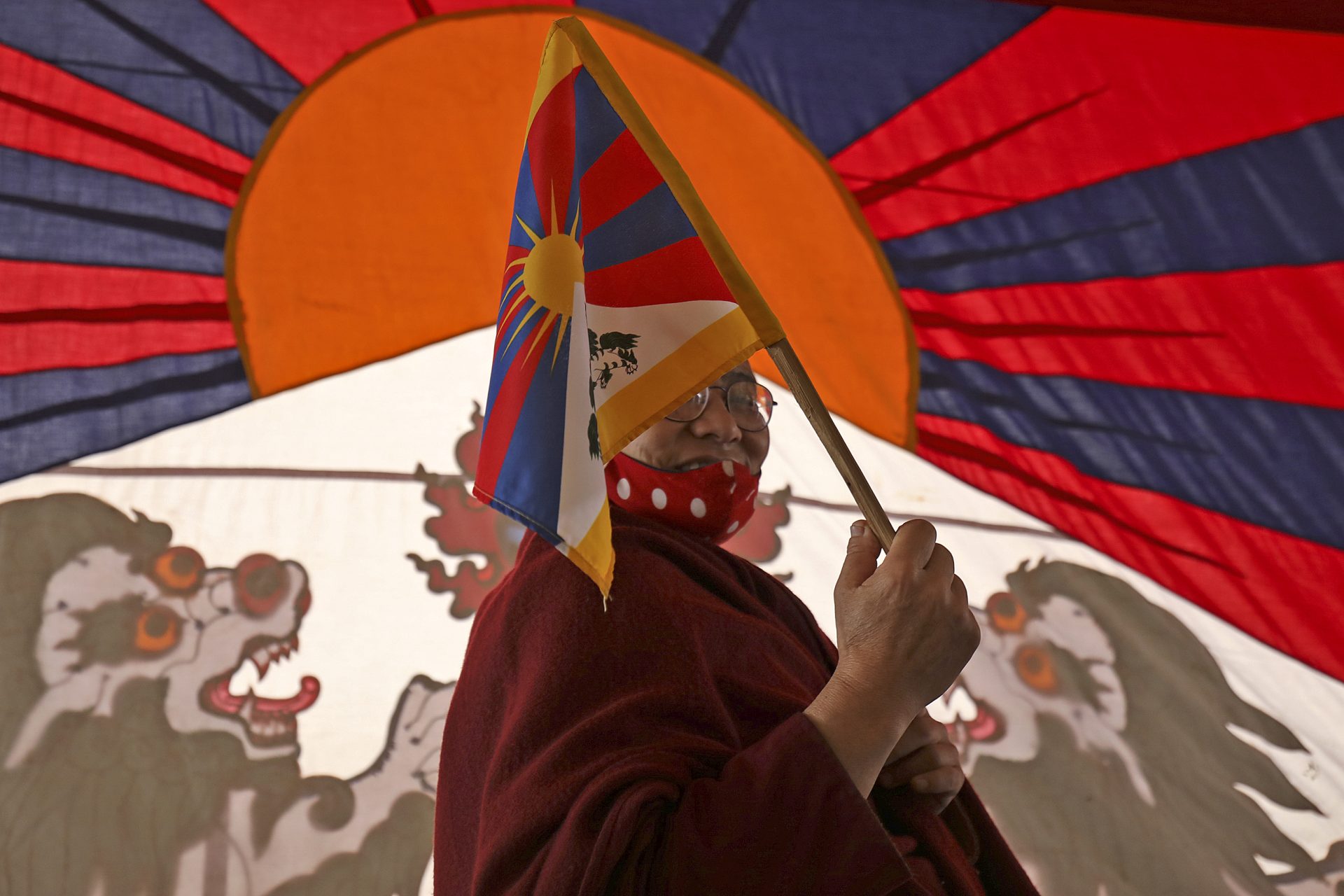Security was noticeably tightened in Tibet’s capital Lhasa Thursday on the sensitive anniversary of an uprising against Beijing’s rule, according to sources in the region, barely a week after a well-known Tibetan singer set himself on fire in protest in front of the city’s iconic Potala Palace.
Sources said that military vehicles were out in force in the capital, while many of the streets were blocked off on the day that, 63 years earlier, saw tens of thousands of Tibetans flood the city to protest China’s occupation of their homeland. The uprising was later crushed by Chinese security forces and led to a heavy crackdown on the Tibetan people and the flight of their spiritual leader the Dalai Lama to India.
“There is a huge Chinese military presence in Lhasa today and the driver of every car or vehicle passing through is being interrogated and told to show their identity card,” one source told RFA’s Tibetan Service, speaking on condition of anonymity.
The source said that as early as last month, authorities had been hiring unemployed Tibetans in settlements on the outskirts of Lhasa to enter the city to “monitor the situation” for any signs of unrest, particularly in areas around the revered Sera, Drepung, and Ganden monasteries.
“Chinese authorities started hiring local Tibetans from [area] villages in February. From one of the villages alone, around 30 unemployed Tibetans were hired, and most were sent to Lhasa and Shigatse,” he said, referring to another prefecture-level city in the Tibet Autonomous Region (TAR).
“They are paid 500 yuan (U.S. $80) per day to do their job and are rewarded extra, depending on what information they provide to the Chinese authorities. Their main job is to listen to conversations for any politically sensitive topics and report people.”
Other sources told RFA in the lead up to Thursday’s anniversary that police had been surveilling the three monasteries in Lhasa day and night, and that controls were significantly tighter than the previous year.
A Tibetan source in the region, who also declined to be named, said that authorities are particularly on edge after a popular contemporary Tibetan singer named Tsewang Norbu shouted slogans and set himself on fire in front of the Potala Palace in Lhasa on Feb. 25.
“The atmosphere is so tense right now and this has had a huge impact on people’s mental health,” the source said, adding that people in the city feel as if someone is always watching them and are afraid to talk to one another.
Norbu, 26, later died of his injuries, becoming the 158th Tibetan confirmed to have set themselves on fire since 2009 to protest Chinese rule in Tibetan areas. Another eight have taken their lives in Nepal and India.

Key sites on lockdown
A third source told RFA that while the Potala Palace and other sites are currently open for visitors, “there are so many Chinese police in uniforms and in plainclothes spread throughout the area to watch every activity.”
“One can see cameras installed all around the Jokhang Temple and people visiting Lhasa from other areas must register their arrival and are scrutinized.”
The Jokhang Temple, in Lhasa’s Barkhor Square, is widely considered the most sacred and important temple in Tibet. The temple was ransacked in 1966 by Red Guards – the youthful political activists of the Mao-era Cultural Revolution – but renovated in the 1970s and designated a UNESCO World Heritage Site in 2000 as an extension of the Potala Palace six years earlier.
The massive hilltop Potala that dominates the Lhasa skyline was the winter palace of historic Dalai Lamas from 1649 until 1959, when the current Dalai Lama fled to India after the uprising against Chinese rule over the formerly independent Himalayan region, triggering a crackdown in which the palace was shelled, and thousands were killed by Chinese troops.
Golok Jigme, a former political prisoner who now lives in Switzerland, told RFA that sources in Tibet had reported harsher controls ahead of the anniversary in Sichuan province’s Kardze (in Chinese, Ganzi) and Ngaba (Aba) Tibetan Autonomous Prefectures, and the Kanlho (Gannan) Tibetan Autonomous Prefecture of Gansu province, including the erection of additional security checkpoints.
“Tibetans are barred from gatherings and prevented from performing any prayer rituals, while their social media chat groups are being monitored, which Chinese authorities falsely claim is part of a bid to control the spread of COVID-19,” he said.
On National Uprising Day in 2008, Tibetans protesting Chinese rule in Lhasa sparked similar protests at monasteries throughout the Tibetan region that were violently repressed by authorities. Some rights groups estimate that as many as 400 Tibetans were killed during the protests, which extended until October 2009.

Solidarity events
Tibetans around the world held events to express their solidarity with those living under Chinese rule in Tibet on Thursday, with several groups protesting outside of Chinese embassies and consulates.
Sikyong Penpa Tsering, the head of Central Tibetan administration in exile in Dharamsala, India, issued a statement to mark Thursday’s anniversary in which he condemned “the ongoing systematic Sinicization of the new generation of Tibetans in Tibet” through policies that encourage ethnic assimilation, enforce the use of Chinese language and close schools for minorities.
He also urged United Nations High Commissioner for Human Rights Michelle Bachelet to investigate reports of human rights abuses in Tibet as part of a scheduled trip to China in May.
In India’s capital, New Delhi, police detained around 70 Tibetan youth protesters who converged on the Chinese Embassy to mark Thursday’s anniversary, before later releasing them.
Tibetan communities and their supporters in several nations including the U.S., Mexico, England, Australia, Spain, Bulgaria, the Czech Republic, and Nepal also held protests outside of Chinese missions calling for an end to Beijing’s rule in Tibet.
Copyright © 1998-2020, RFA. Used with the permission of Radio Free Asia, 2025 M St. NW, Suite 300, Washington DC 20036.







